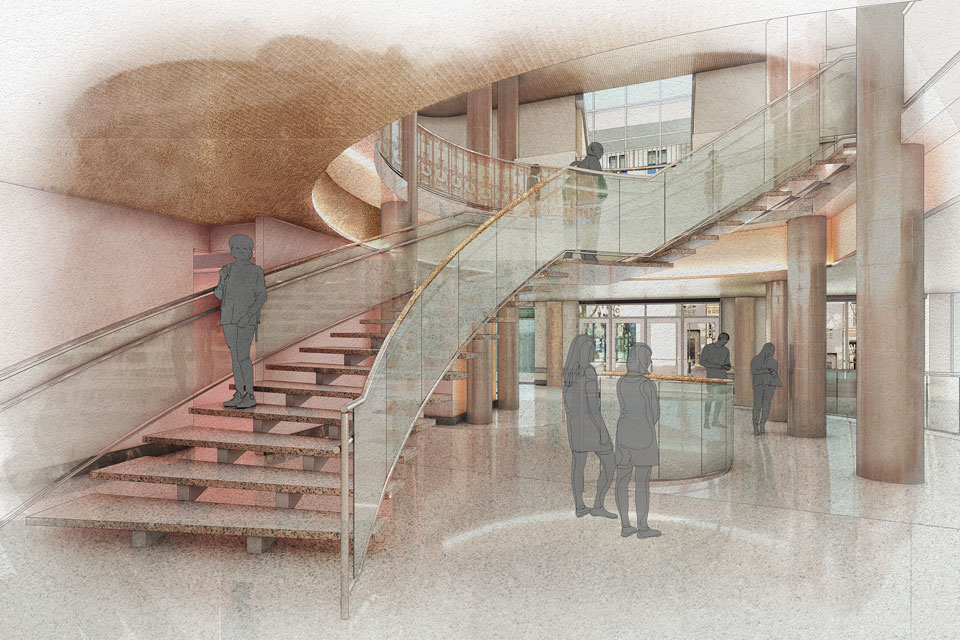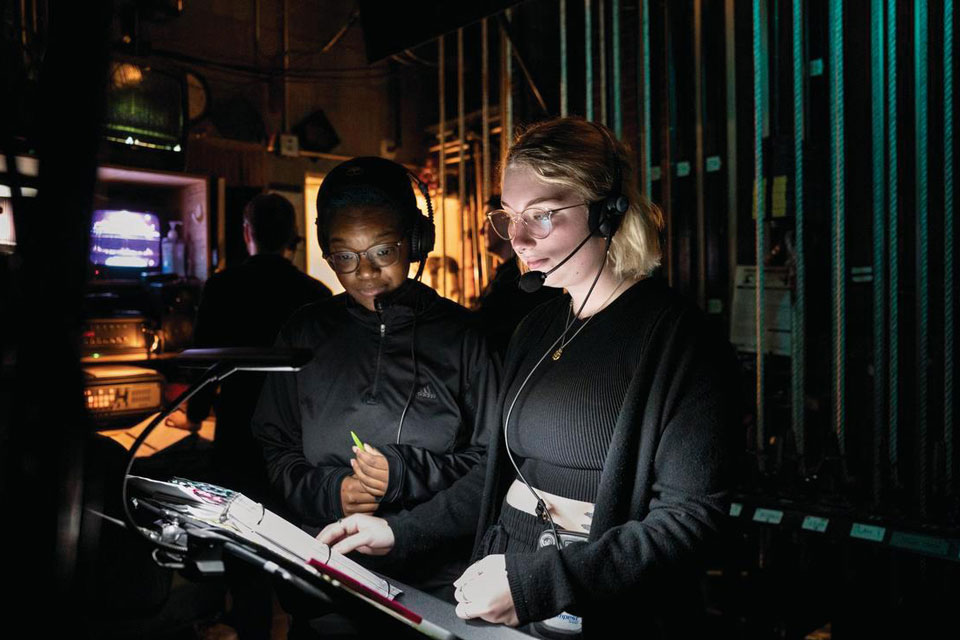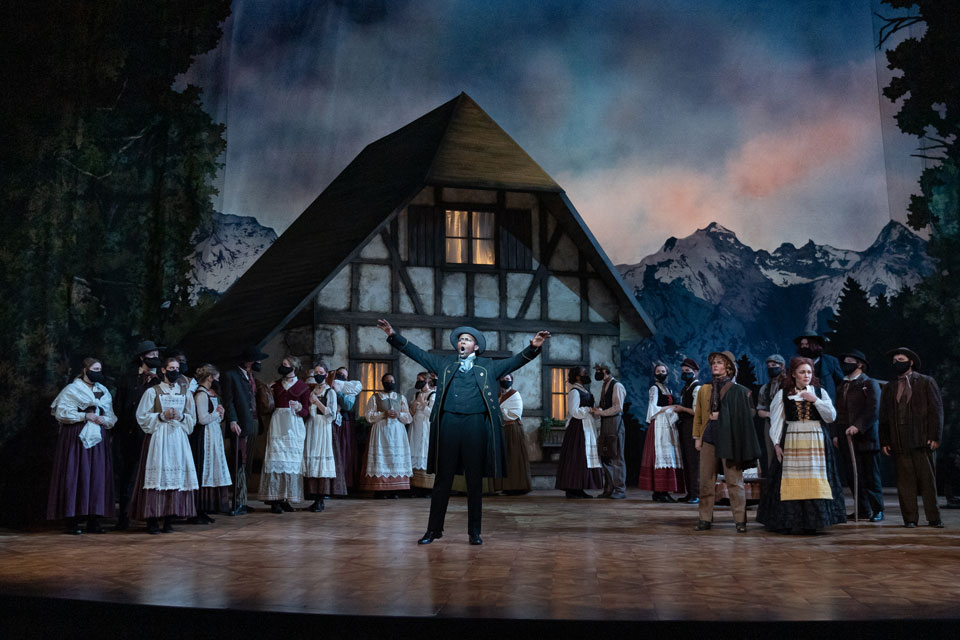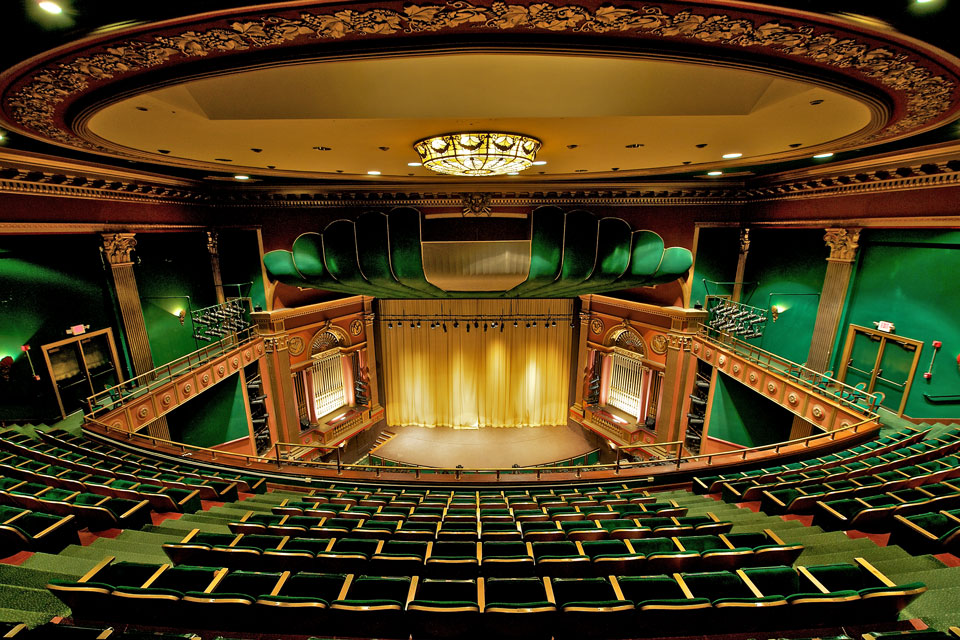03.22.2023
ProjectsStevens Center lobby to be reimagined as part of Phase 1 of comprehensive renovation

The building will close on Nov. 15, 2023, for construction for Phase 1, expected to last two years. It will have been 40 years in April since the last major renovation of the Stevens Center, when it was reopened and renamed after its transformation from the Carolina Theatre.
Phase 1 of the Stevens Center renovation will include a significant redesign of the lobby that will create a more expansive, transformative experience for patrons and bring the Stevens Center in line with modern theaters of today, while making efforts to retain the 1929 building’s historic character. The lobby, which was initially designed to accommodate the needs of the building’s original iteration as a silent movie theater and adapted for the performing arts in 1983, will be redesigned to create a more organic and fluid entry for audiences and visitors as well as increase accessibility and amenities. Improvements focused on patron comfort, such as renovated restrooms and updated concession spaces, will also be included.

In addition to the lobby, the main priority of Phase 1 is to make critical repairs to the exterior of the building to address water intrusion and ensure it is watertight, allowing for improvements to the interior of the venue planned in Phase 2. Phase 1 will include replacing the roof and making repairs to the brick exterior, terra-cotta façade, and windows. Improvements to back-of-house spaces including the dressing rooms and green room will also be made.
“We are thrilled to be making significant progress on Phase 1 of the Stevens Center renovation as we continue to seek Phase 2 funding from the state to improve and preserve this critically important space for many years to come,” said Chancellor Brian Cole. “Creating a world-class performance venue for our student artists and community partners is our top priority. We are thankful for the support from state legislators — particularly our Forsyth County delegation — and the UNC System that has allowed this first phase to move forward, and for the support of the UNC System in our request for funds to complete the renovation.”
“Little is proud to partner with UNCSA and Steinberg Hart to preserve and enhance this important resource for the Winston-Salem arts community,” said Melanie Reddrick, executive principal-in-charge at Little. “Over the last one hundred years, the building has served the city well, and some natural ‘wear and tear’ is to be expected. This first phase strives to execute some critical building envelope repairs that will allow the Stevens Center to serve the city for years to come. Little is looking forward to celebrating the grand reopening with the community once the renovations are complete.”
“Our team has had the pleasure of working with UNCSA and Little over the last few months to design this first phase of the Stevens Center renovation, which brings significant enhancements to the patron and student experience,” said Delia Nevola, managing principal, Steinberg Hart. “With newly established guiding principles for this transformational renovation in mind, we are looking forward to continued collaboration with UNCSA stakeholders to revitalize this stunning space for the entire Winston-Salem community.”

“The Stevens Center is critical to the downtown economy, and a revitalized space will create energy and buzz for our local businesses,” said Jason Thiel, president of the Downtown Winston-Salem Partnership. “We are excited that construction will begin this fall and look forward to a continued partnership between UNCSA and the community to help the process go as smoothly as possible.”
As part of the planning process, UNCSA and the design team established the following guiding principles. Goals of the renovation are to create a Stevens Center that is:
- Modernized: Accessible, safe and comfortable.
- Learning-focused: Supports students in traditional and future learning with space to showcase and represent student work.
- Community-focused: A space that is energizing to the community and the region, including specialized group programs and partner organizations.
- Welcoming: A socially conscious and forward-thinking space for student learning, entertainment and innovation.
- Multiuse: Supports traditional orchestral as well as multimedia performances and collaboration, but not one size fits all.
- Architecturally relatable: Forward-looking while also being mindful of the legacies of Winston-Salem.
The repairs and lobby renovation in Phase 1 set the stage for Phase 2 which, if funded, would complete the renovation and include a comprehensive transformation of the audience chamber, including enhancements to seating and the stage, as well as a reconfigured balcony with improved sightlines. Technological improvements would also be included that will allow students and partners to work with state-of-the-art equipment that meets current industry standards.

UNCSA received a $29.8 million appropriation in the current North Carolina state budget, approved in November 2021, for Phase 1 of the Stevens Center renovation. UNCSA requested an additional $51 million for Phase 2 of the renovation in the UNC System budget that was recently approved by the Board of Governors. If approved by the legislature, the requested funds would allow UNCSA to complete the comprehensive renovation of the performance venue. UNCSA will continue to seek both public and private funding for the renovation as well as to provide long-term support for programming and building maintenance.
Performances will continue in the Stevens Center until the closure on Nov. 15. During the time the facility is closed, UNCSA will present events normally held there in venues on campus and throughout Winston-Salem (details to be announced). UNCSA recently announced that its 2023 “Nutcracker” will be performed at the Tanger Center in Greensboro, Dec. 7-10.
UNCSA will seek input on renovation plans from partner organizations such as the Winston-Salem Symphony, Piedmont Opera and the National Black Theatre Festival, among others, who call the Stevens Center home.

About the Stevens Center
The historic Stevens Center serves as the largest learning laboratory at UNCSA, an economic driver for downtown Winston-Salem, and a cultural destination for residents and visitors. Originally a 1929 silent movie theater, the Stevens Center is a neoclassical building that was restored and reopened in 1983 with a redesigned stage and backstage that was able to house Broadway-scale live performances of music, theater, dance and opera.
Located in downtown Winston-Salem, the 1,300-seat theater is the primary performance space for the University of North Carolina School of the Arts as well as for the Winston-Salem Symphony, Piedmont Opera, National Black Theatre Festival, and several other local arts organizations.
The Stevens Center has had a tremendous impact — locally as an economic catalyst for downtown development, regionally as a cultural anchor since the 1930s, and nationally as the launching pad for the careers of countless actors, dancers, technicians, musicians, and others on stage and behind the scenes.

Once the Carolina Theatre, the facility was renamed for theater producer Roger L. Stevens upon its initial renovation and was reopened April 22-24, 1983, with a star-studded gala featuring the UNCSA Symphony Orchestra with Leonard Bernstein conducting and Isaac Stern as soloist, and Gregory Peck as the master of ceremonies. Guests in attendance included Agnes de Mille, Cliff Robertson, Gov. James B. Hunt, President and Mrs. Gerald Ford, and former First Lady Lady Bird Johnson.
The Stevens Center has played host to a range of notable events including the world premieres of Neil Simon’s “Lost in Yonkers,” winner of a Pulitzer Prize and four Tony Awards, and “Jake’s Women,” a 19-performance sellout starring Alan Alda. The UNCSA Presents series launched in 2018 brought Broadway back to Winston-Salem with “Kinky Boots” followed by “Once,” as well as performances by Kathy Mattea, Flor de Toloache, Steve Earle and the Dukes, Mavis Staples, the Del McCoury Band, Josh Ritter and more as part of the American Music Series.
Other performances throughout the theater’s history have included Rodgers & Hammerstein’s “State Fair,” Victor Borge, the Smothers Brothers, STOMP, Riders In The Sky, the Vienna Choir Boys, Béla Fleck, The Magic School Bus, Carol Channing and Rita Moreno, “Joseph and the Amazing Technicolor Dreamcoat,” Alison Krauss, the 35th Anniversary Reunion of “The Andy Griffith Show,” Gordon Lightfoot, Tony Bennett, the filming of Chris Daughtry’s music video “September” and a critical scene in the 1987 film “The Bedroom Window.” In its days as the Carolina Theatre, the venue even played host to “The King,” Elvis Presley, in 1956.
Follow the Stevens Center renovation at uncsa.edu/stevens.
About Little
Little is a national design firm recognized for crafting exceptional solutions that elevate client performance in the community, retail, workplace and health care industries. With nearly 400 professionals, the firm is recognized for its North Carolina educational expertise and the design of complex renovation projects. Little designed the Queens University Sarah Belk Gambrell Center for Arts & Civic Engagement; the Chapman Culture Center in Spartanburg, South Carolina; and the Central Piedmont Community College Overcash Academic & Performing Arts Center, among other relevant projects. Little combines expertise in traditional architectural services (architecture, engineering, interior architecture) with proficiency in additional diversified architectural consulting services (planning, sustainability, site design, brand consulting, digital visualization and smart building technologies). For more information, visit https://www.littleonline.com/.
About Steinberg Hart
Steinberg Hart is an international architecture, interiors, and planning firm headquartered in Los Angeles. The firm has built a diverse and talented team that works collaboratively across all seven offices challenging one another to develop designs that build community, enhance business, support learning, and connect people with place. For nearly 70 years, Steinberg Hart has shaped environments and created inspiring places through an idea-driven, results-oriented approach to design that spans education, arts, residential, urban mixed-use, hospitality, civic, and commercial sectors. This includes over 280 performing arts facilities designed and delivered nationwide. Steinberg Hart is known for innovation in design thinking and building technologies that help clients realize the full potential of their projects. To learn more, visit https://www.steinberghart.com/.